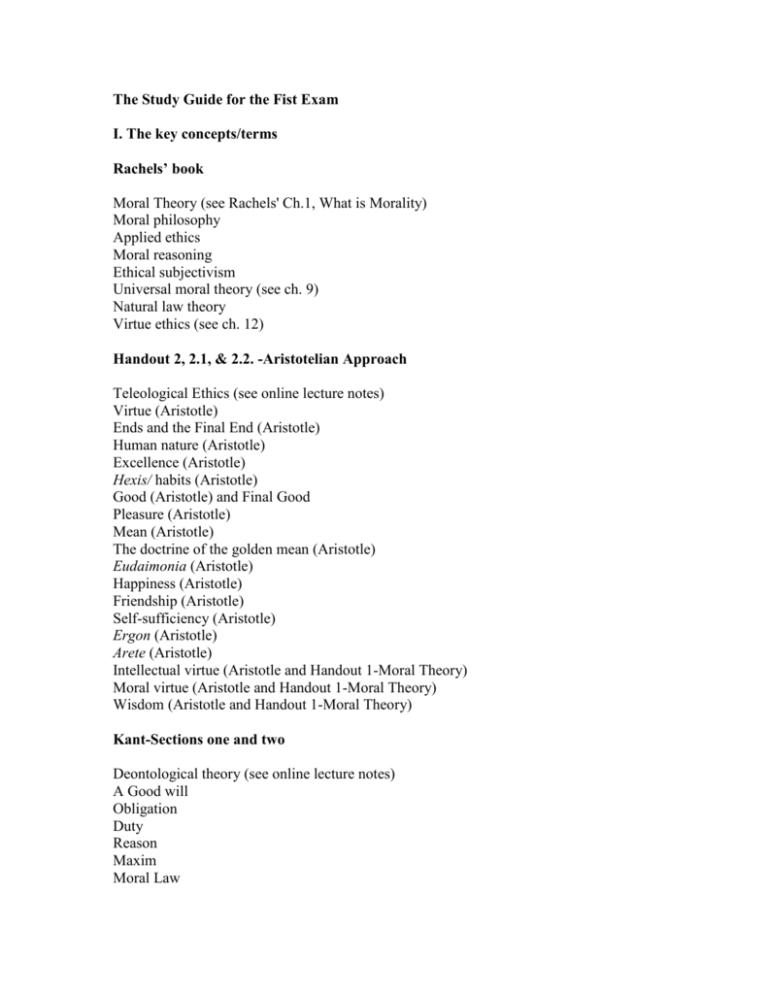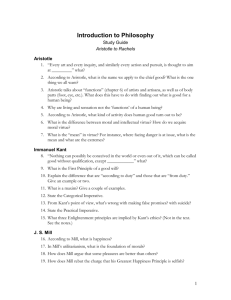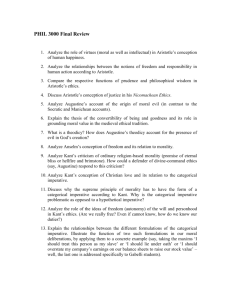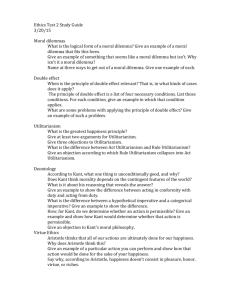The key concepts/terms for the first exam
advertisement

The Study Guide for the Fist Exam I. The key concepts/terms Rachels’ book Moral Theory (see Rachels' Ch.1, What is Morality) Moral philosophy Applied ethics Moral reasoning Ethical subjectivism Universal moral theory (see ch. 9) Natural law theory Virtue ethics (see ch. 12) Handout 2, 2.1, & 2.2. -Aristotelian Approach Teleological Ethics (see online lecture notes) Virtue (Aristotle) Ends and the Final End (Aristotle) Human nature (Aristotle) Excellence (Aristotle) Hexis/ habits (Aristotle) Good (Aristotle) and Final Good Pleasure (Aristotle) Mean (Aristotle) The doctrine of the golden mean (Aristotle) Eudaimonia (Aristotle) Happiness (Aristotle) Friendship (Aristotle) Self-sufficiency (Aristotle) Ergon (Aristotle) Arete (Aristotle) Intellectual virtue (Aristotle and Handout 1-Moral Theory) Moral virtue (Aristotle and Handout 1-Moral Theory) Wisdom (Aristotle and Handout 1-Moral Theory) Kant-Sections one and two Deontological theory (see online lecture notes) A Good will Obligation Duty Reason Maxim Moral Law Means and end (Kant) Categorical Imperatives Hypothetical imperatives Deontological theory Kantian basic principle Universal moral law Kingdom of ends Handouts-Confucianism (Confucius handout and online lecture notes) Li (ritual order) Ren (humanity, benevolent, and love) Gentleman and Small man Xiao (filial piety) Harmony Self-Cultivation Handouts-Cultural Relativism (This will not include in your first text) Cultural Relativism II. Questions: 1. Please explain the following terms and the relations among these terms according to Aristotle’s moral theory: a. Some good and the chief good b. The highest of all goods: 2. How to identify Eudaimonia, please give at least three explanation of what Eudaimonia is: 3. Please use examples to illuminate how Aristotle explains “Areta,” “Mean” and “Excellence”: 4. How does Kant view the similarities between nature law and moral law? 5. How does Kant explain “freedom” and “autonomy”? 6. Why does Kant want us to act according to the duty? 7. What is the role of “reason,” according to Kant? 8. What is a Maxim? How can a Maxim become a Universal Law? 9. How does Kant comment on Self-love and Humanity? 10. What is Categorical Imperative or "The Supreme Principle of Morality" according to Kant? 11. What does “imperative” mean? What are the major differences between “hypothetical imperative” and “categorical imperative”? 12. What are the two formulas of “categorical imperative” according to Kant? 13. Can you find out any “virtues” in Confucianism which are similar to that of in Aristotle? 14. What is the logical weakness in the Culture Differences Argument, according to Rachels (see handout-Cultural Relativism and ch. 2 in his book)? The above will be covered in your first exam Handout 4.0-Utilitarianism 1. The principle of Utility 2. Happiness 3. Ethical Hedonism (Bentham-lecture notes) 4. Hedonistic Calculus (Bentham-lecture notes) 4. Greatest happiness principle (Mill) 5. Pleasure and pain 6. The quality and quantity of pleasure (Mill) 7. Metal pleasure and physical pleasure (Mill) 8. Moral worth and utility (Mill) 9. Desire (Mill) 10. The relation between virtue and happiness (Mill) 12. Means and the end (Mill)






